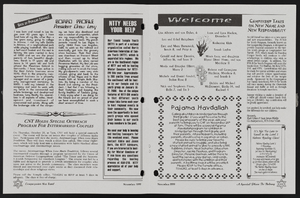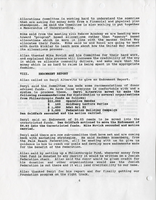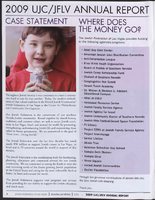Search the Special Collections and Archives Portal
Search Results
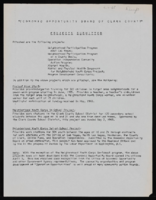
Projects submitted to the Economic Opportunity Board of Clark County: documents
Date
Archival Collection
Description
From the Clark County Economic Opportunity Board Records -- Series II: Projects. This folder contains documents about the projects submitted to the Economic Opportunity Board of Clark County agendas, documents about Work Experience Programs in Nevada, documents about the Economic Opportunity Act of 1964, and neighborhood services center.
Text
Don Ashbaugh Papers on Nevada Ghost Towns
Identifier
Abstract
The Don Ashbaugh Papers (1950-1960) document Las Vegas history, Nevada history, and ghost towns. The collection is comprised of the working manuscript of Don Ashbaugh's book, Nevada's Turbulent Yesterday: A Study in Ghost Towns. The collection also contains typescript drafts, newspaper clippings, and a geographical index of Nevada ghost towns.
Archival Collection
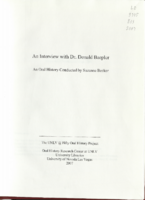
Transcript of interview with Dr. Donald Baepler by Suzanne Becker, April 23, 2007
Date
Archival Collection
Description
Text
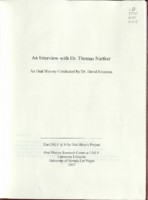
Transcript of interview with Dr. Thomas Nartker by Dr. David Emerson, November 13, 2006
Date
Archival Collection
Description
Text
Jhone Ebert (Department of Education) oral history interview conducted by Magdalena Martinez and Elia Del Carmen Solano-Patricio: transcript
Date
Archival Collection
Description
From the Lincy Institute "Perspectives from the COVID-19 Pandemic" Oral History Project (MS-01178) -- Education sector interviews file.
Text
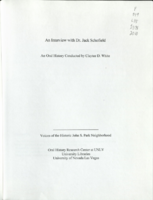
Transcript of interview with Dr. Jack Lund Schofield by Suzanne Becker, January 13, 2009
Date
Archival Collection
Description
In the dusty border town of Douglas, Arizona, Dr. Jack Lund Schofield was born in the family home in 1923. Due to the economic woes of the Great Depression, the Schofield family moved several times until 1937—the year that Jack's father took a position as a tungsten broker and moved his family of five children to Nevada. For Jack, who was ready to start high school, the move from Phoenix to Las Vegas with a small population of 5000 was a shock. However, it did not take the gregarious Jack long to make friends at Las Vegas High School. He played sports and was a Golden Glove boxing champion. As Jack's high school years drew to an end, two major events occurred: he met his future wife and World War II began. He proudly highlights his service as a fighter pilot in both WWII and the Korea conflict, his family genealogy, and his devotion to being an excellent educator, businessman, family man, and politician. In 1995, he earned his doctorate in education at the age of 72. His resume includes being an elected official, serving on the Board of Regents and having a middle school named after him. Jack and his wife, Alene, have resided in the John S. Park Neighborhood for over 50 years and describes his affection for the neighborhood and some of the changes that have occurred.
Text

Transcript of interview with Christie Young by Dennis McBride, October 18, 1998
Date
Archival Collection
Description
I've known Christie Young for many years and was grateful she agreed to be interviewed for the Las Vegas Gay Archives Oral History Project. Not only is she frank in what she says, but her background as a researcher in sexual issues and as a straight woman involved in the gay community give her a unique perspective. Ancillary to her donation of this interview transcript to the University of Nevada, Las Vegas, Christie has generously donated her personal journals which detail more than a decade of her life including the years she worked with Las Vegas's gay community . Christie shares the project's concern that documentation of the gay community is ephemeral and vanishes rapidly; her determination that her contribution to that community be preserved greatly enriches our knowledge and will benefit future scholars.
Text

